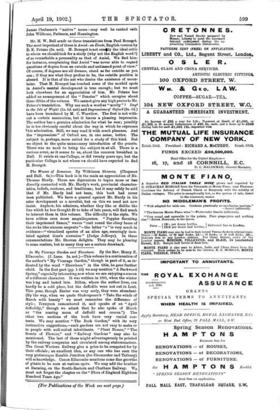Mr. H. W. Bell sends us three translations from Paul
Bourget. The most important of these is Amid: an Etude, English version by D. K. Petano (3s. net). M. Bourget is not exa4ly the ideal critic to whom we should look for a study (why not the English word ?) of so remarkable a personality as that of Amiel. We find him, for instance, complaining that Amid "was never able to regard questions of dogma from an outside and unbiassed point of view." Of course, if dogmas are all dreams, stand as far outside as you can ; if they are what they profess to be, the outside position is absurd. It is that of the ant who denies the existence of moun- tains. That M. Bourget has touched some of the morbid spots in Amid's mental development is true enough ; but we must look elsewhere for an appreciation of him. Mr. Petano has added an arrangement of the " Pensees" which occupies about three.fifths of the volume. We cannot give any high praise to Mr. Petano's translation. Why use such a word as " acuity " ? Days in the Isle of Wight (1s. 6d. net) and Impressions of Oxford (3s. Gd.) have been translated by M. C. Warrilow. The first is not with- out a certain mannerism, but it leaves a pleasing impression. The author has a genuine admiration for what he sees ; possibly he is too obviously careful about the way in which he expresses this admiration. Still, we may read it with much pleasure. And the " impressions " of Oxford are, in one sense, better. The subject is, perhaps, more suited for a study of this kind. But we object to the quite unnecessary introduction of the grisette. There was no need to bring the subject in at all. There is a curious error, as it seems to us, about the common breakfast in Hall. It exists at one College, or did twenty years ago, but the particular College is not where a e should have expected to find M. Bourget.










































 Previous page
Previous page